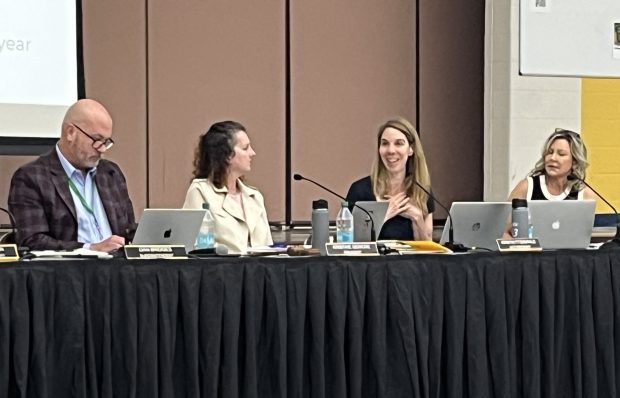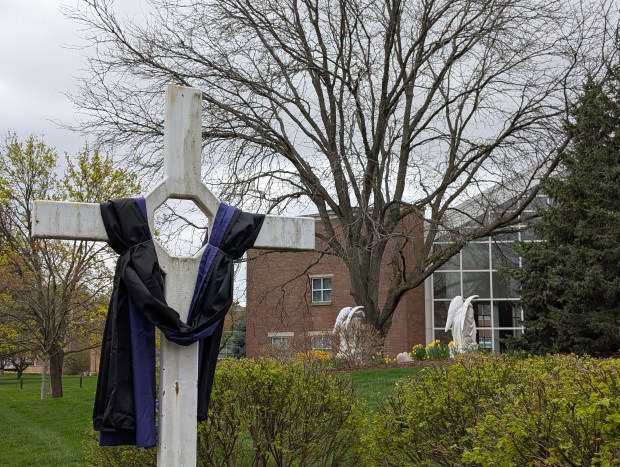The Naperville District 203 School Board Monday tabled a vote on the Innovative School Experience after board members could not agree on making the major changes to students’ day without additional community input.
Some board members said they were not comfortable with endorsing the shifts to the school day unless they had a firm commitment from the community. While stressing they weren’t asking to abandon the concept or start over, the concensus was they should pause and allow time for more data to be collected.
The Innovative School Experience proposed by district administration calls for several changes that proved unpopular with some parents, teachers and students. Among them were the recommendations that 15 minutes be added to the elementary school day, more math instruction minutes be added to middle school day and a flexible block format with an anchor day be implemented for middle and high school students.
The block format allows for longer classes during the day so students can delve deeper into topics or receive more intervention and teachers can use differentiated instruction strategies, district officials said. The anchor day is a chance for students to attend all of their classes once a week, but for a shorter period of time.
As part of the schedule changes, the start and end times would be adjusted across the board, with elementary-aged students starting their school day first and middle school students starting and ending their day last among the different grade levels.
On Monday, administrators asked the board to approve three facets of the plan that would affirm the new learning structures, create a committee to review school start and end times, and launch the changes in the 2026-27 school year. The committee would make its recommendation to the board in June.
After a lengthy discussion, the board was divided over they could support the recommendations, especially the new learning structures, without first exhausting all avenues of feedback. Attempting to modify the wording in the recommendation failed to move forward.
“If we push this to a vote, we are going to be very divided, and I think it creates the wrong image on where the board is in response to the Innovative School Experience,” said board member Donna Wandke, who had tried to clarify the language in the recommendation to assuage all concerned board members.
Superintendent Dan Bridges said the district needs clarity to move forward and asked to work with district staff on its recommendation for the board to consider in the future. As a result, the board voted unanimously to table the recommendation.
Board member Charles Cush said the ideas behind the Innovative School Experience will benefit the students, but “you cannot have benefits without understanding costs.”
“There is not a question in my mind that the intent behind (the Innovative School Experience) in terms of what we are trying to do, what we are trying to accomplish, is noble and good and makes a lot of sense,” Cush said. “But it has to be at the right cost.
“It just feels to me like we are dragging the community kicking and screaming into this without actually getting support and feedback,” he said.
There are too many unanswered questions, Cush said.
“We have never done anything in this community as an island,” he said. “It has always taken the support of the community and the support of the fantastic teaching staff that we have implementing these plans in our schools. Anything short of that, to me, doesn’t make any sense.”
The original plan was to have the proposal approved by the board in February for implementation in August. After pushback from parents, staff and students, the district delayed the start to the 2026-27 school year.
Cush said because of this timeline, he believed there was extra time to gather more feedback from parents and staff.
“Honestly, if we put out a survey and we get two responses, we tried,” Wandke said. “I don’t feel like we tried.”
Bridges noted that the changes will be subject to the collective bargaining agreements with the various unions in the district.
Board members acknowledged the research that went into coming up with ways to improve the school experience, reducing achievement gaps and addressing the schedule so students aren’t arriving to school long before their day starts.
And officials mentioned there have been several avenues of feedback already sought, including focus groups, staff meetings, video messages, written and verbal comments, and discussions between principals and parent groups at the building levels.
Board President Kristine Gericke said the bumps in the rollout have to be separated from the ideas that will be implemented.
“In order for the thoughts to stop swirling in my head, I had to ask myself what is my why?” Gericke said. “It continues, for me, to be to focus on what is best for our kids. What do they need to succeed in this world? What do they need to succeed in whatever career path they choose?
“The kids are at the center of this,” she said.
Michelle Mullins is a freelance reporter for the Naperville Sun.




